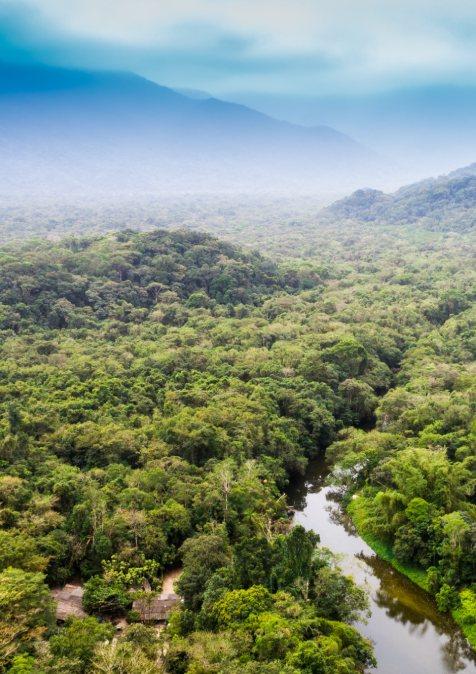This episode focuses on the Africa Pulse Report 2025, the World Bank’s flagship analysis of economic trends and policy challenges in Sub-Saharan Africa. As the region works to strengthen its recovery while contending with structural and macroeconomic difficulties, Andrew Dabalen, Chief Economist for the Africa Region at the World Bank, shares key insights and takeaways from this year’s edition.
RELATED CONTENT
-
AuthorsApril 16, 2025The second Trump administration’s reversal of federal climate policy is reshaping the U.S. energy and industrial landscape, with significant implications for macroeconomic performance, clean technology competitiveness, and global climate cooperation. While the deregulatory shift and emphasis on fossil-fuel production may generate short-term output gains in selected sectors, the long-term structural transformation necessary for sustained growth in an increasingly low-carbon global ec ...
-
 AuthorsJune 27, 2024The earth’s average surface temperature in May 2024 was higher than any other May on record, marking the twelfth consecutive such record-breaking month. According to the European Union’s Copernicus Climate Change Service, May’s temperature was 1.52 degrees Celsius above the pre-industrial average, while temperatures over the past twelve months have averaged 1.63°C above (Figure 1). Global sea surface temperatures have also set records over the past fourteen months. Consider ...
AuthorsJune 27, 2024The earth’s average surface temperature in May 2024 was higher than any other May on record, marking the twelfth consecutive such record-breaking month. According to the European Union’s Copernicus Climate Change Service, May’s temperature was 1.52 degrees Celsius above the pre-industrial average, while temperatures over the past twelve months have averaged 1.63°C above (Figure 1). Global sea surface temperatures have also set records over the past fourteen months. Consider ... -
 AuthorsMannat JaspalJune 11, 2024Carbon trading have long been touted as a silver bullet to channelise climate finance to African countries lacking the capital to support climate mitigation and adaptation efforts. The erstwhile ‘Kyoto Protocol’ and its successor ‘The Paris Agreement’, though much more comprehensive and wider in scope, both recognize the importance of carbon trading (a form of carbon pricing) in combatting climate change, and in the Paris Agreement the same is enshrined under Article 6 and its sub-c ...
AuthorsMannat JaspalJune 11, 2024Carbon trading have long been touted as a silver bullet to channelise climate finance to African countries lacking the capital to support climate mitigation and adaptation efforts. The erstwhile ‘Kyoto Protocol’ and its successor ‘The Paris Agreement’, though much more comprehensive and wider in scope, both recognize the importance of carbon trading (a form of carbon pricing) in combatting climate change, and in the Paris Agreement the same is enshrined under Article 6 and its sub-c ... -
November 30, 2023In this episode, we dive into the pressing necessity for climate initiatives in Africa. Despite its minimal global emissions, Africa grapples with severe climate challenges and a substantial funding shortfall. Yet, as obstacles persist, including the disconnect between investor expectat...
-
AuthorsSeptember 5, 2023This paper was originally published on ecdpm.org COP27 reached a breakthrough agreement on a new loss and damage fund for vulnerable countries and opened the door for a review of the international financial architecture. Ahead of COP28 at the end of 2023, the AU-EU partnership can help drive global climate change and energy transition agendas forward. A fruitful collaboration between the two continents starts with the following: • Africa and Europe must find comm ...
-
 AuthorsJuly 5, 2023This policy brief was originally published on t20ind.org Despite the perception of abundant financial resources and technology worldwide, building quality project pipelines of sustainable infrastructure and securing funding for them remains a challenge for most developing countries. One potential solution to these obstacles is international cooperation among governments through enhancing cooperation among their national, regional, and multilateral development banks, wh ...
AuthorsJuly 5, 2023This policy brief was originally published on t20ind.org Despite the perception of abundant financial resources and technology worldwide, building quality project pipelines of sustainable infrastructure and securing funding for them remains a challenge for most developing countries. One potential solution to these obstacles is international cooperation among governments through enhancing cooperation among their national, regional, and multilateral development banks, wh ... -
 June 20, 2023This policy brief was originally published on T20 India website A decade of poor growth, increased poverty, and political instability followed the serious debt difficulties that emerged worldwide in the 1980s. There are concerns that the looming debt crisis could create similar challenges and result in even more severe consequences. However, the current economic climate differs in many ways from that of the 1980s, when international banks and Paris Club credi ...
June 20, 2023This policy brief was originally published on T20 India website A decade of poor growth, increased poverty, and political instability followed the serious debt difficulties that emerged worldwide in the 1980s. There are concerns that the looming debt crisis could create similar challenges and result in even more severe consequences. However, the current economic climate differs in many ways from that of the 1980s, when international banks and Paris Club credi ... -
June 15, 2023Dr. Zaki Chahir, professeur en économie, a récemment publié un article intitulé "What Type of Trade is Promoted by Environmental Regulations" (Quel type de commerce est favorisé par les réglementations environnementales ?), dans lequel il examine l'imp...
-
AuthorsApril 26, 2023It is estimated that $1 trillion to $6 trillion per year (up to 2050) needs to be invested globally if the world is to stay below the 2°C global warming ceiling of the Paris Agreement and to meet its adaptation goals. Currently, investments stand at about $630 billion per year, way below the original target. And although great efforts have been made in the climate-finance area, more than 70% of the funds deployed have gone to one sector, renewable energy, followed by the transportat ...
-
 AuthorsMarch 7, 2023In April 2007, on my first day as vice president at the Inter-American Development Bank (IDB) in Washington D.C., I received an informal visit from Thomas E. Lovejoy, a celebrated American environmental scientist who died last year. He spoke to me of a “turning point” in deforestation in the Amazon, beyond which the consequences would be irreversible. He was interested in knowing how the IDB could help in the fight against deforestation. Thomas and the Brazilian environmental scien ...
AuthorsMarch 7, 2023In April 2007, on my first day as vice president at the Inter-American Development Bank (IDB) in Washington D.C., I received an informal visit from Thomas E. Lovejoy, a celebrated American environmental scientist who died last year. He spoke to me of a “turning point” in deforestation in the Amazon, beyond which the consequences would be irreversible. He was interested in knowing how the IDB could help in the fight against deforestation. Thomas and the Brazilian environmental scien ...





